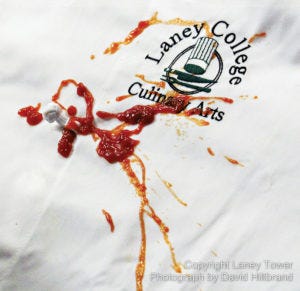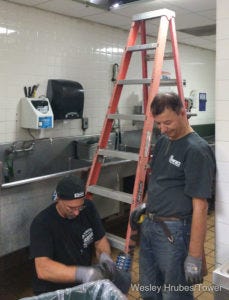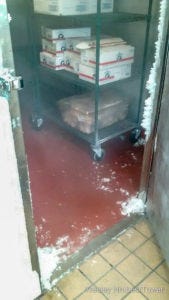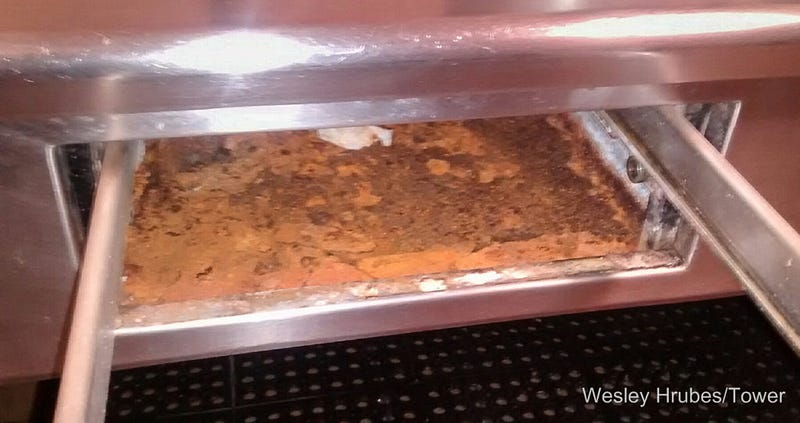Battle for solvency forces cafeteria to open despite concerns over health and safety
On Sept. 7, the Laney College Cafeteria opened for

business, serving up breakfast from the hot line steam tables to students and faculty for the first time in months. The cafeteria as a whole, including the steam tables, had been shut down in August for failing county health inspections.
But by 4 p.m. on Sept. 8, the Alameda County Department of Environmental Health had stepped in to shut down the steam tables once again.
The department officially ruled that the steam tables were hazardous: they were malfunctioning and unable to maintain food at safe temperatures. The steam tables, which provide hot food, will remain closed until they can hold potentially hazardous foods at or above 135 degrees.

Yet a single look at the cooking facilities in the cafeteria made it apparent that food should not have been prepared there. On the afternoon of Sept. 8, as the cafeteria dealt with the lunch rush, maintenance technicians were still repairing an active plumbing leak directly above the sink used to sanitize all of the pots and pans used in the kitchen.
The technicians said “sewage” was leaking out of the pipes in the ceiling above the washing station. The source of the leak was a corroded pipe joint with a large hole more than one inch in diameter.
Meanwhile, the food being served upstairs was between 15 to 35 degrees below the standard temperature for safe food service, as measured that morning by Laney College Culinary Arts Instructor David Jones. He also reported that the hot water in some of the hand washing and food prep stations did not reach the safe minimum of 100 degrees.
Additionally, in the downstairs men’s restroom used by Culinary Arts students and kitchen staff, there was a broken urinal, covered in plastic wrap and duct tape. None of its sinks produced hot — or even warm — water. The upstairs men’s restroom, meant for public use, was completely closed down.
Laney College Food Services Manager Scott Strong admitted the facilities were old, and that there were outstanding issues to deal with, namely the steam tables and the men’s restroom urinals.

Strong said he couldn’t comment on the hand washing station, but did confirm that the steam tables were malfunctioning, allowing temperatures to fluctuate. He also said the steam tables were being serviced, new urinals were to be installed, and that the repairs would be made before the health inspector returned at the end of September.
NUMEROUS VIOLATIONS
Over the past two years, the cooking facilities in the Culinary Arts Department have been closed several times for violations of health and fire codes, or for improvements. In 2015, exhaust fans in the kitchen were replaced after the fire marshal deemed the existing exhaust fans unsafe for use.
Later, in January 2016, the exhaust fans in the Laney Bistro had to be replaced, which required them to close the kitchen during construction. Then, in April, the health department closed the Student Center cafeteria and kitchen because the boiler was not providing hot enough water.
The most recent county inspection, conducted on Aug. 30, highlighted yet another list of dangerous problems: inadequate hot water at hand washing and food prep stations; a complete lack of hot water in the men’s restroom; plumbing leaks; missing hand towel dispensers at hand washing stations; a damaged door gasket on a walk in freezer unit; broken urinals in the men’s restroom; and an unsanitary, unusable men’s bathroom on the main floor of the Student Center.

Jones has been particularly vocal about his concerns regarding food safety in the Student Center kitchen. He has taught at Laney for over 12 years, and been at the forefront of a campaign to improve the working and teaching conditions in the Laney Culinary Arts program. He has fought for students to have access to exceptional culinary training, while trying “to teach the highest standard of food safety.”
There have been hurdles over the years, but Jones believes “things are better now than they have been in years past.” He also said there are persistent issues with the facilities that continue to exist and pose a serious risk to sanitation and food safety.
Jones said he tested the temperature of the steam trays in the cafeteria used for keeping hot food warm enough to be safely served throughout the day. He believes that the steam trays do not reach a minimum of 131 degrees and therefore should not be used.
This is, however, a point of contention. Others in the Culinary Arts Department believe that the food only needs to be at 131 degrees if it is to sit in the trays for a period of four hours or more, and health and safety codes do allow for this contingency.
Jones doesn’t think professors should be setting such a low bar for students — and future chefs.
“You want to teach people the highest standard of food safety because they will be working in restaurants,” he said.
But despite the loophole, Strong still chose to close the steam tables on Sept. 8. (Read the Tower’s analysis of why this occurred at right.) They were not reopened, nor were they replenished with more food. Then, later that day, the health inspector’s ruling kept them closed indefinitely.
CONFLICT OF INTEREST
Read our analysis to learn why the cafeteria was effectively forced to open despite concerns over safety.

























